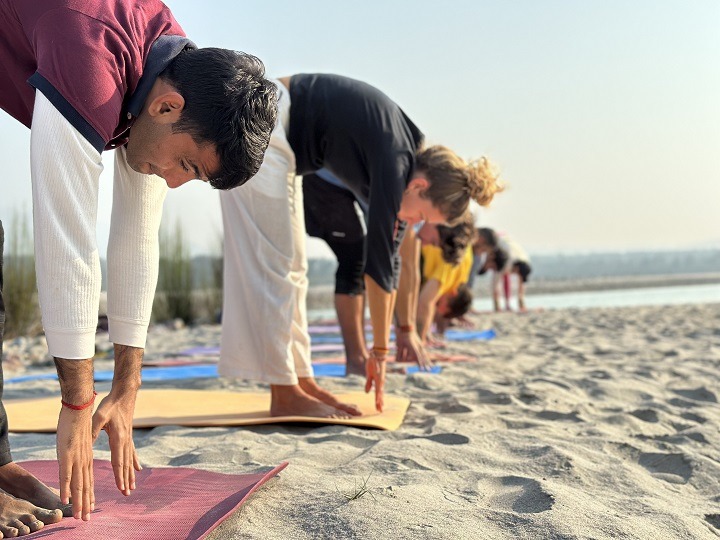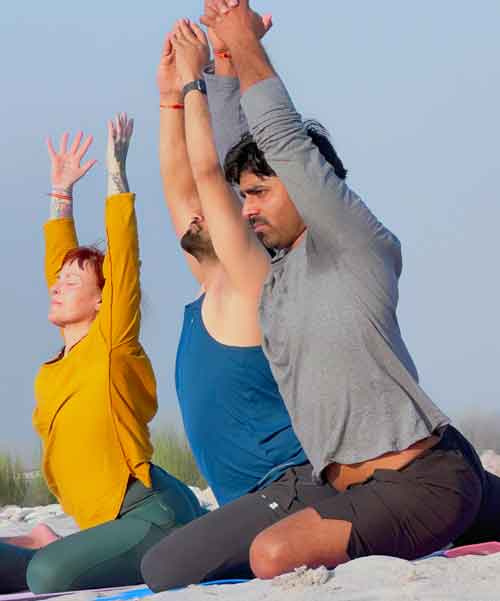“Arogya” is a Sanskrit word that means “health” or “well-being”. In traditional Indian culture, the concept of arogya is associated with the balance and harmony of the body, mind, and spirit. It emphasizes the importance of maintaining good health and preventing diseases through a holistic approach that includes a balanced diet, regular exercise, proper sleep, stress management, and spiritual practices such as yoga and meditation.
Arogya Yoga School is a yoga school located in Rishikesh, India, which is known as the “Yoga Capital of the World”. It was founded in 2014 by Yogacharya Azad and Rajneesh and his team of yoga experts, and it offers a variety of yoga teacher training programs, yoga retreats, and workshops.

Arogya Yoga School is affiliated with Yoga Alliance USA and offers 200-hour Yoga TTC, 300-hour Yoga TTC, and 500-hour yoga teacher training courses, which are recognized worldwide. The courses are designed to provide a comprehensive understanding of yoga and its various practices, including asanas (yoga postures), pranayama (breathing exercises), meditation, and yogic philosophy.

The school also offers various yoga retreats and workshops for people who want to deepen their yoga practice, as well as for those who want to experience the traditional Indian culture and lifestyle. The retreats and workshops include yoga and meditation, detox and rejuvenation, and Ayurveda, kundalini among others. Arogya Yoga School has a team of experienced and dedicated yoga teachers who provide individual attention and guidance to each student. The school is situated in a serene and peaceful environment, which is perfect for learning and practicing yoga.
Arogya Yoga School Syllabus and Curriculum
The syllabus for a Yoga Alliance certified school varies depending on the type and level of teacher training Retreat program. However, all Yoga Alliance certified schools must cover the following topics in their curriculum:
- Techniques, Training, and Practice: This includes the study and practice of yoga asanas, pranayama, meditation, and other yoga techniques.
- Teaching Methodology: This covers the principles of teaching yoga, including communication skills, class planning, and teaching techniques.
- Anatomy and Physiology: This includes the study of human anatomy and physiology, as well as the impact of yoga practices on the body and mind.
- Yoga Philosophy, Ethics, and Lifestyle: This covers the study of yogic philosophy, ethics, and the yogic way of life.
- Practicum: This involves observing and assisting in yoga classes and teaching practice under the supervision of experienced yoga teachers.
- Mudras: Mudras are hand gestures used in yoga and meditation practices to enhance physical, mental, and spiritual well-being. The word “mudra” comes from the Sanskrit language, and it means “seal” or “gesture”.
- Pranayama: Pranayama is the practice of controlled breathing in yoga, which is believed to help regulate the flow of prana (life force energy) in the body, calm the mind, and promote overall physical and mental health. The word “pranayama” comes from the Sanskrit language, and it means “extension of the life force energy”.
- Meditation: Meditation is a practice of training the mind to cultivate inner peace, clarity, and focus. It involves various techniques and approaches, including mindfulness, visualization, chanting, and movement.
- Satkarma: ”Satkarma, also known as Shatkarma, is a set of traditional yogic practices that are designed to purify and cleanse the body and mind. The word “satkarma” comes from the Sanskrit language and means “six actions”.
- Ethics and Professionalism: You will learn about the ethical principles and professional standards for yoga teachers, including creating boundaries, respecting students’ privacy, maintaining professionalism, and embodying the yogic values both on and off the mat.
- Practicum and Teaching Practice: You will have opportunities to practice teaching yoga under the guidance of experienced instructors. This includes receiving feedback and refining your teaching skills.
- Sound Healing Session
- Ayurvedic full body Massage
In addition to these core topics, Yoga Alliance certified schools may offer specialized courses in areas such as prenatal yoga, restorative yoga, or Ayurveda, among others.
It’s important to note that the specific curriculum and requirements for Yoga Alliance certification can vary between different programs and schools. Therefore, it’s important to research and choose a reputable and suitable school that aligns with your personal goals and values.


